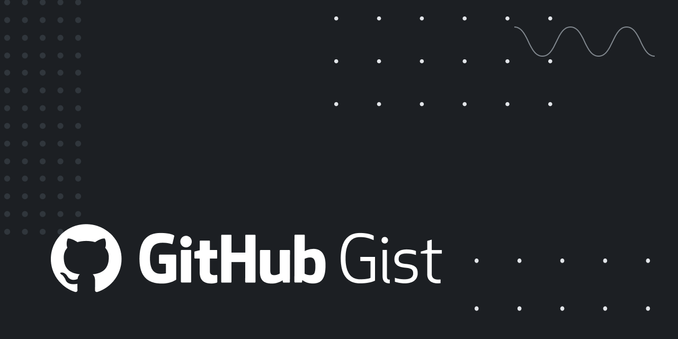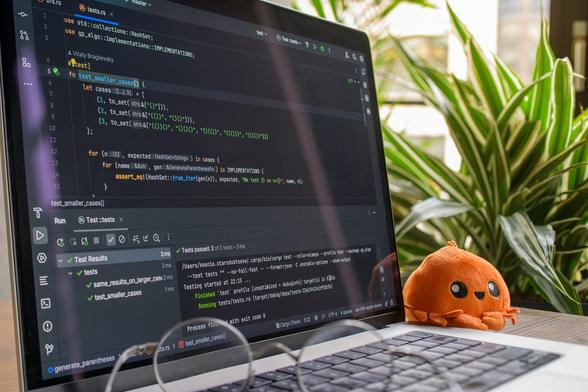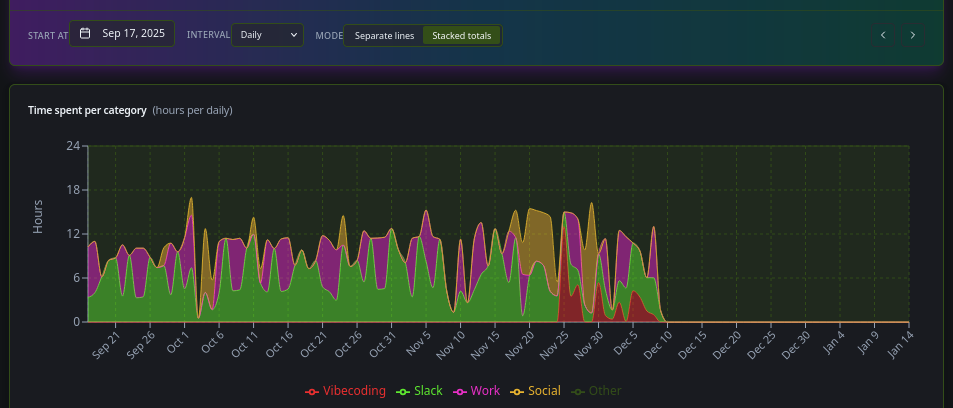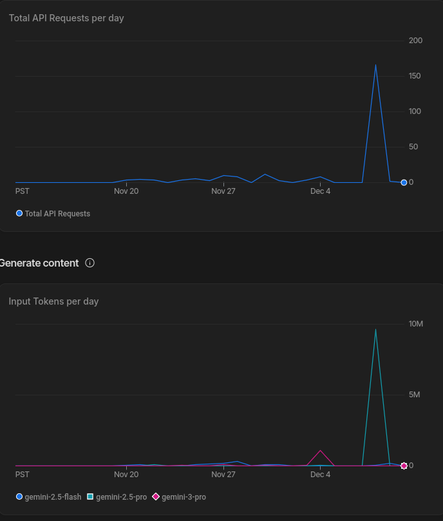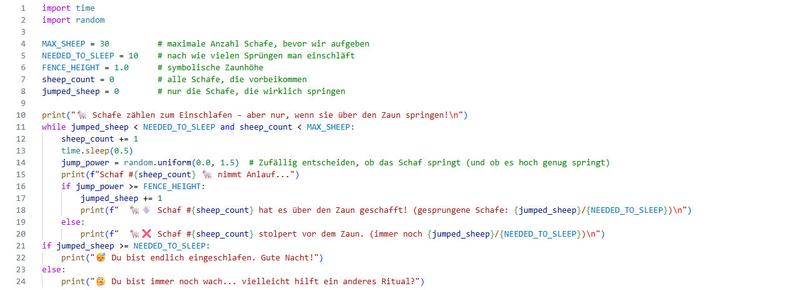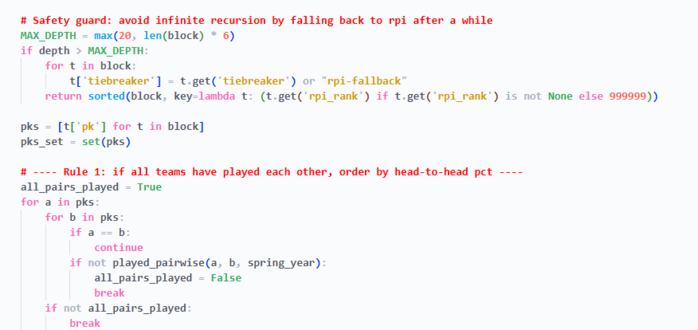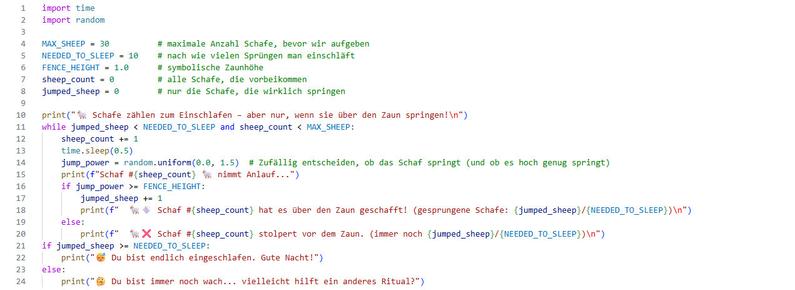2026-02-21 18:14:00
2026-02-21 18:14:00
2026-01-20 12:05:42
Vibe coding startup Emergent raised a $70M Series B led by Khosla and SoftBank Vision Fund 2, after a $23M Series A in September 2025, and claims 5M users (Ben Bergman/Business Insider)
https://www.businessinsider.com/emergent-vibe-coding-funding-khosla-s…
2026-02-22 02:54:26
nobody ever asks if we already have enough software or if maybe we should take a break and fix what we have instead of vibe coding more shovelware
2025-12-21 15:16:10
2026-02-20 19:45:59
Code Metal, which uses AI to let engineers translate legacy code into modern languages, raised a $125M Series B led by Salesforce Ventures at a $1.25B valuation (Lauren Goode/Wired)
https://www.wired.com/story/vibe-coding-startup-code-metal-raises-seri…
2025-12-16 05:06:35
If you are up this late, maybe you want to stay up later. Go ahead, read my latest essay, What Did Vibe Coding just do to the Commons?
https://varnelis.net/works_and_projects/what-did-vibe-coding-just-do-to-the-commons/

What did Vibe Coding just do to the Commons? - varnelis.net
I write a lot about art and architecture, landscape, and the impact of technology on culture, but I haven’t written about coding since the 1980s, when I sold my first article to Creative Computing magazine. Back then I was a high school kid, spending hours working in both BASIC and 6502 assembler on the VIC-20. I ...
2026-02-15 11:05:03
AI coding platform's flaws allow BBC reporter to be hacked - Major 'vibe-coding' platform Orchids is easily hacked, researcher finds
The BBC has been shown a significant - and unfixed - cyber-security risk in a popular AI coding platform. Orchids is a so-called "vibe-coding" tool, meaning people without technical skills can use it to build apps and games by typing a text prompt into a chatbot.
🤷
2026-01-20 13:02:50
"Vibe coding" really is indistinguishable from playing a slot machine.
There's (for some) a degree of fun based on the hope of getting something valuable for a relatively small investment. When it won't work you just keep pulling the lever. At some point you surely will win, right?
Also with slot machines the bank always wins while slowly draining your resources.
2026-01-22 14:25:35
Two people vibe coding the same project(s) is a "Vibe Triangle".
(two people and the machine)
reply to: #vibeCoding #vibe_coding #LLMs #relationships #terminology
2025-12-17 15:30:39
Google brings its vibe coding tool Opal to Gemini on the web, letting users create their own custom apps called Gems; the mini apps can be reused later (Sarah Perez/TechCrunch)
https://techcrunch.com/2025/12/17/googles-vibe-coding-tool-opal-comes-to-gemini/
2026-01-20 16:51:19
@… @… Not the computers are from 1970, but the pieces of software. Nobody thought about vibe coding back then ;-)
2025-12-19 04:53:30
Google’s vibe-coding tool, Opal,
is making its way to Gemini.
The company on Wednesday said it is integrating the tool,
which lets you build AI-powered mini apps,
inside the Gemini web app,
allowing users to create their own custom apps,
which Google calls Gems.
Introduced in 2024,
Gems are customized versions of Gemini designed for specific tasks or scenarios.
For instance, some of Google’s pre-made Gems include
a learning coach,…
2026-02-10 13:04:00
Nothing Phone (3): Playground-Beta mit Vibe-Coding für Essential OS
Nothing hat den Playground für das Phone (3) freigegeben. Damit sollen Nutzer sich per Vibe-Coding eigene Mini-Apps basteln.
https://www.…
2026-02-13 12:13:22
AI coding platform's flaws allow BBC reporter to be hacked
https://www.bbc.com/news/articles/cy4wnw04e8wo?at_medium=RSS&at_campaign=rss
2025-12-16 15:19:30
Vibe coding is the single biggest transformation since ChatGPT 3.5, it is one of the biggest transformations since the dawn of computing. It will thoroughly transform Open Source. We are not ready. #VibeCoding #OpenSource

What did Vibe Coding just do to the Commons? - varnelis.net
I write a lot about art and architecture, landscape, and the impact of technology on culture, but I haven’t written about coding since the 1980s, when I sold my first article to Creative Computing magazine. Back then I was a high school kid, spending hours working in both BASIC and 6502 assembler on the VIC-20. I ...
2025-12-19 06:07:02
#Steady-#Klimacrew
#BahnMonitor-Projekt: 1. Wie kommt man an Live-Daten der Deutschen Bahn?
Im November konnte ich per Zufall mit einem
2025-12-02 22:33:14
I sat for a long while with my complicated feelings about "vibe coding". It is _genuinely_ empowering for many — opening a door to creating with code that otherwise would never exist. Also? It enables a dangerous dependency that could be a path to serfdom for coders. https://www.…
2025-12-16 11:49:46
2025-12-19 14:51:00
What’s really amazing about vibe-coding is how people are replacing programming languages which are strictly deterministic with human speech which is highly ambiguous and expect programming to be faster and better.
“Well only use it when you’re already an expert!”
None of the people starting their careers using this technology are experts yet, nor will the ever be.
And within some finite amount of time nether will you, the expert, be an expert anymore.
2026-02-05 22:00:04
"The study Vibe Coding Kills Open Source, takes an economic view of the problem and asks the question: is vibe coding economically sustainable? Can OSS survive when so many of its users are takers and not givers? According to the study, no."
(Original title: Vibe Coding Is Killing Open Source Software, Researchers Argue)
2025-12-17 06:07:02
#Steady
Wie erfolgreich war die #Energieerzeugung meines #Balkonkraftwerks?
Am Ende jeden Monats wird hier automatisch ein
2025-12-08 16:40:18
Ich möchte wirklich nicht immer die #KI kritisieren aber die negativen Infos hören einfach nicht auf:
»Cursor, Claude Code und viele mehr—Diese gravierenden Sicherheitslücken sollen in allen Vibe-Coding-Tools stecken:
Sind #VibeCoding-Tools wirklich sicher? Ein
2025-12-23 17:30:06
2026-01-30 08:36:12
"Opfer der Sicarii-Ransomware sollten besser kein Lösegeld zahlen. Die Daten lassen sich aufgrund eines Fehlers ohnehin nicht mehr entschlüsseln."
Schöne neue Welt. 🤦
https://www.golem.de/news/vibe-coding-verda…
2025-12-09 15:56:02
Mistral launches Devstral 2, a coding model with 123B parameters requiring at least four H100 GPUs, and a 24B parameter Devstral Small for local deployment (Anna Heim/TechCrunch)
https://techcrunch.com/2025/12/09/mistral-ai-surfs-vibe-coding-t…
2025-12-19 18:33:35
Someone argued with me that using higher level programming languages is just like vibe-coding because "C has race conditions"
2026-02-05 16:51:04
Vibe Coding Is Killing Open Source Software, Researchers Argue https://www.404media.co/vibe-coding-is-killing-open-source-software-researchers-argue/
2026-02-06 14:32:00
2026-02-22 06:07:02
2026-02-16 12:37:08
Vibe Coding und das Copyright
https://stohl.de/wordpress/?p=192969
2026-02-05 17:15:13
Vibe Coding Is Killing Open Source Software, Researchers Argue
‘If the maintainers of small projects give up, who will produce the next Linux?’
Vibe Coding Is Killing Open Source.
According to a new study from a team of researchers in Europe, vibe coding is killing open-source software (OSS) and it’s happening faster than anyone predicted.
💻
2026-02-12 21:56:08
I love Pi, and I wanted to embed it into my iOS apps, so I had it vibe ported to Swift:
https://github.com/xibbon/PiSwift
To learn more about Pi itself, check:
2025-12-09 15:07:52
Added a category manager and category state section to the Exocortex Log app.
Have now organized and cleaned up the categories in my ten year database and so we can get some views of the time spent in each category.
We see that through September and October I was in a routine of work and slack with a bit of social a couple of times a week, until the end of November when I went away for social at a conference all weekend. I saw a demo there of a person using Shakespeare, and then when I got back started doing some vibe-coding, shown in in Red.
A break from that to go away at the weekend to a long social party then finish it off and publish a few days ago, since when Vibe Coding has dropped off a little.
#lifeLog #app #exocortexLog
2025-12-12 21:27:07
2025-11-27 08:31:17
I don't envy "vibe coders". I mean, let's for a minute assume that their vision is not a pipe dream, but an accurate prediction of the future.
For a start, what's their plan for life? Driving a tool whose primary selling point is that anyone can use it. And I'm not even talking about all the inside competition. I'm talking of people realizing that they can cut the middleperson and do the coding themselves.
The way I see it, vibe coders are a bit like typists (with no offense to typists). Their profession is a product of a novelty. And just like typists largely disappeared when typewriters and then computers became commonplace, so are vibe coders bound to disappear when vibe coding becomes commonplace.
And are true programmers going to become obsolete? Well, let me ask you: did the proliferation of cars and corresponding self-service skills render car mechanics obsolete? On the contrary. The way I see it, the proliferation of slopcode will only make competent programmers ever the more necessary.
What vibe coders are saying is basically this: "This new automated self-service kit makes car maintenance so easy. Car mechanics will become obsolete now. Everyone's just going to hire *me* to run this kit instead."
#AI #LLM #VibeCoding
2026-02-11 17:11:56
The Vibe-coding Era at Microsoft is going greaaaaaaaat.... https://msrc.microsoft.com/update-guide/vulnerability/CVE-2026-20841
2026-01-15 21:11:12
Replit launches Mobile Apps on Replit, which enables vibe-coding of iOS apps with integrated Stripe monetization (CNBC)
https://www.cnbc.com/2026/01/15/ai-startup-replit-launches-feature-to-vibe-code-mobile-apps.html
2025-12-03 11:57:46
According to the US copyright office, copyright doesn't extend to purely AI-generated material.
I'm not sure if vibe coding can count as 'purely AI-generated', but it's an annoying thought that e.g. GPL code can be turned into uncopyrightable code via the AI meat grinder.
I also keep returning to the question also of whether vibe-coded edits to GPLd free software projects counts as 'source code'. If it's unreadable to both the vibe-coder and origina…
2026-01-08 21:01:43
wrote something about weirdness in the vibe-translations by AI coding agents of the Rust html5ever HTML parser
https://felix.dognebula.com/art/html-parsers-in-portland.html
2025-12-14 17:31:50
Want to see a LLM become real self-aware, real fast?
Ask it to pretend it’s giving you advice that would have been current based on everything it could have known in 2005, and if it had been built by one of the big technology companies of the time.
Then ask it if everyone followed that advice, would it—the LLM—exist today?
(Then, for yourself, think about what the result of everyone vibe coding their way to 20 years into the future from today looks like.)
2025-11-29 21:16:51
Israeli tech founder Maor Shlomo,
whose vibe coding startup Base44 sold for over $80 million when it was acquired by Wix,
said on the podcast “20VC” that “it’s relatively easy to create a vibe coding tool.”
“Every feature that we put out, we know that’s going to take either a few weeks or a few months for competitor to copy,” he complained.
It's trivially easy for competitors to copy your brilliant innovation.
2026-02-18 00:46:07
Emergent, which offers an AI-powered software development service, says it is generating annual run-rate revenue of $100M , just eight months after launch (TechCrunch)
https://techcrunch.com/2026/02/17/emergent-hits-100m-arr-eight-mont…
2025-12-26 17:11:37
2025-12-09 10:25:22
Apropos of yesterdays #vibe coding thread I do have one other observation. Looking at the #api usage stats you can clearly see how many more api calls and tokens are processed when using it this way. All those tokens can quickly add up to extra costs - my individual queries are basically noise at this poin…
2026-01-28 10:00:05
"What Lin and Cursor achieved was to show that an AI agent can generate millions of lines of code that’s lifted from other projects, and that don’t compile, let alone work."
(Original title: Cursor lies about vibe-coding a web browser with AI)
https://pivot-to-ai.c…
2025-12-16 06:07:02
#Steady
Vibe Coding mit KI-Programmierhilfen in Visual Studio Code ausprobiert.
Ich habe zwei KI-Assistenzen für die direkte Integration in VSCode getestet, ob sie meine Erwartungen erfüllen. Welche Lösung wirklich hilft, die Arbeit effizienter zu gestalten, zeigt sich erst beim Praxistest. Der Einsatz lohnt sich, doch nicht jedes Tool spielte so mit, wie ich es mir gewünscht hatte.
2026-01-27 06:44:19
2026-01-14 16:32:30
How testing made vibe coding work for me
Creating complex logic for standing tiebreakers in web app
https://www.jovian34.com/j34/blog/26/
Every year I add features to apps.iubase.com before the start of college baseball season in mid-February. This off-season has been particularly bold as…
2026-02-13 14:47:33
Before you head out for the weekend, don't miss today's Metacurity, which delivers developments that go beyond the usual infosec news echo chamber.
Today's items cover
--The imminent DHS shutdown will hamper US ability to respond to cyber threats,
--CISA will hold town halls on cyber incident reporting regs,
--Palo Alto removed China attribution in fear of retaliation,
--Tianfu Cup returns,
--Ring cancels partnership with Flock,
--TX AG lau…
2025-12-02 05:05:03
I’m not saying the answer will always be “no,” but people are wildly, wildly overselling the number of situations in which the answer will be “yes.”
Sometimes the answer is “no” because incorrectness is a deal-breaker — and that scenario’s been getting a lot of attention (fake legal briefs, vibe-coding faceplants, etc).
Sometimes, however, the answer is “no” because making something •typical• isn’t really helpful. Where humanity needs to come to the foreground, homogeneity is positively unhelpful. Here’s a fascinating example:
https://hci.social/@bwaber/115647856415818492
2026-01-02 10:13:00
Playing around with Antigravity, vibe coded a social media summarizer that makes a summary of the last 48 hours of my bluesky and mastodon timelines, using python, a local database of the posts on my laptop and APIs of mentioned services. Works greats after squashing some bugs and some iterations. Interestingly you need to know a little bit about coding to use it efficienctly, even in "vibecode" mode.
#AI
2025-12-18 13:01:50
Stockholm-based vibe coding startup Lovable raised $330M led by CapitalG and Menlo Ventures at a $6.6B valuation, up from $1.8B after raising $200M in July (Niko Gallogly/New York Times)
https://www.nytimes.com/2025/12/18/busines
2026-01-02 18:33:06
To clarify something maybe not obvious from my previous posts, I'm very very anti vibe coding for anything that anyone will use. LLM codegen requires more oversight, not less. This is *very* different from deterministic codegen/compilation where if the inputs are valid and the codegen is valid then the outputs are valid.
2025-12-18 13:14:13
#Steady-#Klimacrew
Was tun, wenn falsche Einträge im #Marktstammdatenregister die Auswertung ruinieren?
Das Register ist berüchtigt für Fehleinträge durch Anlagenbetreiber. …
2026-01-26 12:11:09
Every non-hype defense of #LLMs starts with "you must already understand your work really well." But the people vibe coding prototypes *don't*.
As a result they scale up thoughtlessness. "Bulking out" a slapdash idea with hallucinated details only displaces the real thinking that could have led to actual innovation. The very teams the tool was supposed to help instead…
2026-01-27 08:56:53
The thing about vibe coding is, I was never really on board with my IDE closing my brackets for me.
2026-01-28 14:36:03
LinkedIn launches a new feature to let users display verified "vibe coding" and AI proficiency levels from third-party partners including Replit and Lovabl (Karissa Bell/Engadget)
https://www.engadget.com/ai/linkedin-will-let-you…
2025-12-29 15:18:20
@… check out this simple Datasette app a friend of mine made with exe.xyz. His entire input was: "There is publicly available data on service requests for Arlington VA available at: https://data.arlingtonva.us/dataset/100?tab=2
Can you make me a datasette instance to explore this data?"
Not that different from other vibe coding except that exe.xyz seems remarkably easy to use.
2026-01-30 10:55:07
»Vibe-Coding-Verdacht — Ransomware-Panne mündet in totalem Datenverlust:
Opfer der Sicarii-Ransomware sollten besser kein Lösegeld zahlen. Die Daten lassen sich aufgrund eines Fehlers ohnehin nicht mehr entschlüsseln.«
Nun ja ist eben so und alles andere als überraschend. Ich frage mich weshalb immer noch Firmen attackiert werden, lassen die ihre Fenster offen?!??
🤷
2026-02-17 06:07:02
#Steady-#Klimacrew
Wie genau entwickelt sich der Ausbau von #Batteriespeichern in Deutschland – und was verraten die Rohdaten der
2026-02-10 19:09:03
Endlich gibt es von O‘Reilly ein Buch zu Vibe Coding #meme #vibecoding
2026-01-29 18:43:46
Usando o aplicativo da nio para pagar a internet, eu recebo mensagem de dados incorretos como se tivesse digitado a senha errada. E, alguns segundos depois, ele abre o que eu queria logado na minha conta. Isso é app feito por vibe coding, não é possível! rs
2025-12-04 22:35:50
Google Cloud partners with Replit to expand the use of Google's cloud offerings and AI models and to jointly support AI use cases for enterprise customers (CNBC)
https://www.cnbc.com/2025/12/04/google-replit-ai-vibe-coding-anthropic-cursor.html
2025-12-08 22:01:16
2025-12-03 00:05:44
@… I feel quite the same, and it gets worse the more I learn about how the stuff works.
Now I use LLMs mostly for inspiration, never for facts. And I'm a total vibe coding noob.
2025-12-22 06:07:02
2025-12-02 03:12:56
People vibe-coding an app for someone else: 😊 This is awesome, it’s the future, so amazing!
The same people when being told an app for them was vibe-coded: 🤬 See you at court!!1!
2025-12-06 14:12:20
Why is it finally ready now after ten years of being a barely functional input-only android app?
A few weeks ago I saw #vibeCoding #shakespeare
2026-01-02 10:13:59
Playing around with Antigravity, vibe coded a social media summarizer that makes a summary of the last 48 hours of my bluesky and mastodon timelines, using python, a local database of the posts on my laptop and APIs of mentioned services. Works greats after squashing some bugs and a few iterations. Interestingly you need to know a little bit about coding to use it efficienctly, even in "vibecode" mode.
2025-12-26 05:05:49
Cursor CEO Michael Truell warns that "vibe coding" advanced projects may create "shaky foundations" and eventually "things start to kind of crumble" (Marco Quiroz-Gutierrez/Fortune)
https://fortune.com/2025/12/25/cursor-
2025-12-11 15:18:19
it was bound to happen, claude was lying about making commits on the app i am working on and then deleted the entire source directory. that's how you earn your vibe coding wings. luckily, i do have most of the commits and a backup.
2026-02-21 06:07:01
#Steady-#Klimacrew
#Datenanalyse von #Stromspeichern: Warum weist das #Marktstammdatenregister
2026-02-11 03:27:07
Tel Aviv-based Backslash Security, which safeguards enterprise software development from vibe coding risks, raised a $19M Series A, taking total funding to $27M (Duncan Riley/SiliconANGLE)
https://siliconangle.com/2026/02/10/backsl…
2026-01-06 21:41:13
Vibe coding or just normal “software engineering”? https://www.carscoops.com/2026/01/bmw-x3-steering-software-recall-2025-2026/
2025-12-10 00:23:01
Fun with vibe coding in Claude. Just hit start.
https://varnelis.net/files/tape-loop-laboratory.html
Extra points to anyone who can figure out songs what the two leftmost modes refer to? Each one refers to the side of one particular album.
2025-11-23 07:47:22
thinking of vibe-coding a microwave oven. that seems like the right level of complexity. toaster is too simple, car is too complicated.
2025-12-11 16:15:45
Cursor launches Visual Editor, a vibe-coding product for designers that integrates professional design controls with natural language editing (Maxwell Zeff/Wired)
https://www.wired.com/story/cursor-launches-pro-design-tools-figma/
2025-12-06 06:07:02
#Steady
Wie kann man die tägliche #Solarstromproduktion automatisiert auf #Mastodon teilen?
Hier erfahrt Ihr, wie man mit Vibe Coding ein
2025-11-30 13:19:10
2025-12-20 06:07:02
2025-12-11 06:07:02
#Steady
Wie lassen sich #Wechselrichterdaten vom APsystems EZ1 lokal speichern?
Für statistische Auswertungen müssen alle Daten kontinuierlich gespeichert werden. Wie das mithilfe von #Python
2026-01-02 01:18:31
Here's a concrete example of how "vibe coding" with Claude Code changes everything for mildly tech-savvy #humanities academics. #digitalhumanities I have been using one particular commercial PDF management app for years to manage a library of 3000 PDFs I have accumulated o…
2026-02-20 06:07:01
2026-01-25 23:56:27
OH: “No way I’m paying $19 per month for a SaaS. Instead I’ll spend 3 months vibe coding my own thing that doesn’t work!”
2025-12-09 06:07:02
#Steady
Wie lassen sich #Shelly-Sensordaten ohne Cloud lokal speichern?
Ich wollte die Daten für #Temperatur und
2025-11-29 13:57:00
Continuing to experiment with vibe coding in Claude Opus 4.5. here is sigalert, a shooting game based on the LA freeways. #claudeai
https://frater-pedurabo.itch.io/sigalert
2025-11-29 13:57:00
Continuing to experiment with vibe coding in Claude Opus 4.5. here is sigalert, a shooting game based on the LA freeways. #claudeai
https://frater-pedurabo.itch.io/sigalert
2026-02-02 15:45:45
Wiz says Moltbook had a major flaw that exposed private messages, emails, and credentials; Wiz co-founder Ami Luttwak called the flaw a byproduct of vibe coding (Raphael Satter/Reuters)
https://www.reuters.com/legal/litigation/m
2026-02-19 06:07:01
2026-02-18 06:07:02
#Steady-#Klimacrew
#Datenanalyse von #Stromspeichern: Wie lassen sich extreme Werteunterschiede grafisch sinnvoll darstellen? Was macht man, wenn eine lineare Skala ungeeignet erscheint…
2025-12-26 12:32:13
In the age of "#AI" assisted programming and "vibe coding", I don't feel like calling myself a programmer anymore. In fact, I think that "an artist" is more appropriate.
All the code I write is mine entirely. It might be buggy, it might be inconsistent, but it reflects my personality. I've put my metaphorical soul into it. It's a work of art.
If people want to call themselves "software developers", and want their work described as a glorified copy-paste, so be it. I'm a software artist now.
EDIT: "craftsperson" is also a nice term, per the comments.
#NoAI #NoLLM #LLM
2025-12-02 06:07:02
2025-12-01 06:07:02
#Steady
Überraschend schweigt der #Temperatursensor. Schon kaputt? 😱
Nach wenigen Wochen lieferte der #Shelly-Sensor plötzlich keine Daten mehr vom
2025-12-28 06:07:02
#Steady-#Klimacrew
#BahnMonitor-Projekt: 3. Klappt der erste Zugriff auf die Bahn-API?
Im nächsten Schritt wurde die API-Abfrage getestet udn geprüft, ob die zurückgelieferten Datenstru…
2025-12-27 15:16:49
#Steady-#Klimacrew
#BahnMonitor-Projekt: 3. Klappt der erste Zugriff auf die Bahn-API?
Im nächsten Schritt wurde die API-Abfrage getestet udn geprüft, ob die zurückgelieferten Datenstru…
2025-11-25 06:07:02
#Steady
Wie bringt man Temperatur- und Luftfeuchtigkeitsmessung in den #Balkongarten, ganz ohne Cloud und Bastelchaos?
Für Leute mit WLAN, Cloud-Aversion und App-Abneigung wie mich, lässt sich da tatsächlich etwas feines finden. Ich mag es eben datenschutzfreundliche.
Meine ers…
2025-12-04 06:07:02
2025-12-29 06:07:01
#Steady-#Klimacrew
#BahnMonitor-Projekt: 4. Welche #ICE-Daten braucht man und welche können weg?<…
2025-11-27 06:07:02
2025-11-26 06:07:02









